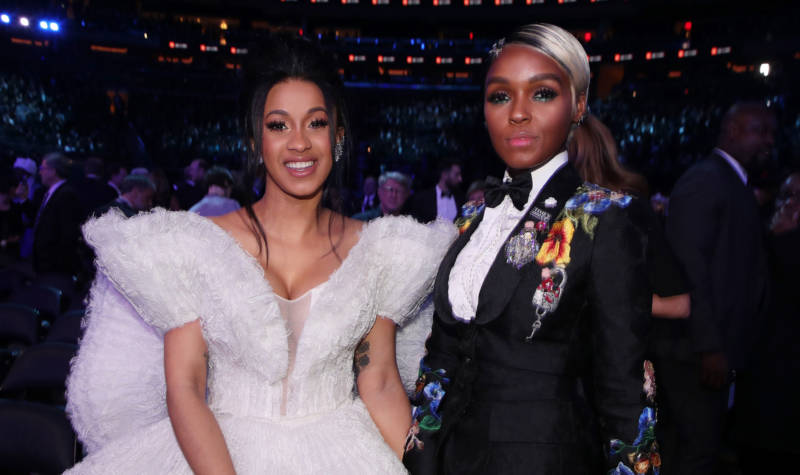The clutter of names makes gaming out winners trickier than ever. Vote-splitting among similar artists and genres could be a major factor. For example, rootsy singers Brandi Carlile and Kacey Musgraves might siphon off each other’s album of the year votes, leaving an open lane for… it’s hard to tell, really. Monáe’s Dirty Computer was adored by critics, Black Panther was a commercial juggernaut spearheaded by Kendrick Lamar (who’s due after a few high-profile snubs in the category), Cardi B dominated both the 2018 pop charts and the cultural conversation. And so on.
Traditionally, the Grammys have skewed toward safe and/or legacy artists in the major categories, as evidenced by a quarter-century’s worth of album of the year wins for the likes of Tony Bennett, Celine Dion, Steely Dan, U2, Herbie Hancock, Mumford & Sons, Adele (over Beyoncé’s Lemonade!), Beck (over Beyoncé’s Beyoncé!), Taylor Swift (over Kendrick Lamar’s To Pimp a Butterfly!), Bruno Mars (over Kendrick Lamar’s DAMN.!) and so on. Before this year, Beyoncé, Kendrick Lamar and Kanye West have been nominated in the album of the year category three times apiece, and each has come up empty. Generally speaking, hip-hop has fared poorly in the category over the years — Eminem is also 0-for-3 — so a win for Cardi B, Drake or Black Panther would represent a notable shift. (A win for Monáe would qualify, as well.)
2) “Women need to step up.” A year ago, Grammys president Neil Portnow spoke those five profoundly stupid words, shoving both loafers straight into his gullet as he opined on what turned out to be a heavily male-dominated slate of Grammy winners. (To refresh your memory on that controversy, here’s some of Anastasia Tsioulcas’ indispensable reporting, from last February and November.)
The Recording Academy — the voting body that chooses each year’s Grammy winners — has attempted to broaden and diversify its membership since last year’s debacle, when best new artist winner Alessia Cara was the only woman to pick up her own Grammy during the night’s Bruno Mars-intensive telecast. Portnow announced last year that he will step down this summer, and the Grammys have a history of pivoting immediately after public-relations fiascoes. (See: Kendrick Lamar winning heavily in the hip-hop categories after getting swept by Macklemore in 2014, or Metallica dominating the heavy-metal category after losing to Jethro Tull in 1989.) How and whether those correctives translate to the actual awards this year is and will remain a major Grammy storyline this year.
3) Whither on-stage activism? In 2018, against a backdrop of sexual-misconduct allegations in the entertainment industry (and more wide-ranging objections to Donald Trump and his administration), the Grammys mostly stayed muted, politically speaking. With Alicia Keys replacing genial James Corden, the host’s commentary could certainly get bolder and more cutting this time around. (The name of former Keys collaborator R. Kelly might pop up, for example.) And several of the scheduled A-list performers — the increasingly outspoken Cardi B, for one, as well as Monáe, among others — are unlikely to keep their musical contributions entirely commentary-free.
4) Which moments will resonate? Last year’s Grammys were pretty limp overall, but they still served up a few tableaux that dominated “The Conversation” for a handful of minutes. Kesha’s powerful, choir-backed “Praying” stood out, as did Kendrick Lamar’s show-opening performance. (And remember how they kept trotting out Sting for some reason?)
This year, in addition to the aforementioned Cardi B and Monáe, announced performers include Camila Cabello, Brandi Carlile, Miley Cyrus, Dan + Shay, H.E.R., Little Big Town, Post Malone, Ricky Martin, Shawn Mendes, Maren Morris, Kacey Musgraves, Red Hot Chili Peppers, Diana Ross, Chloe x Halle, Lady Gaga, Mark Ronson, Travis Scott, Dua Lipa and St. Vincent, and Yolanda Adams, Fantasia and Andra Day. It’s hard to predict which performers will pop — some artists share the stage and wind up getting far less face time than others — but Cyrus and Gaga have a long history of using awards-show performances to get people talking.
5) Who, if anyone, will sweep? Last year’s telecast was a slog of repeat winners (hello again, Bruno Mars! back already, Chris Stapleton?), as well as prominent shutouts (Jay-Z famously went 0-for-8, SZA went 0-for-5, “Despacito” went 0-for-3, and so on). The Grammys often dole out their trophies in bunches — remember those photos of Norah Jones clutching a giant pile of statuettes she’d just won? — so we might get a sense of a dominant night early on. Likeliest future pile-clutchers? Cardi B, Kacey Musgraves and Janelle Monáe are all beyond plausible, but don’t be surprised by a string of big wins for Brandi Carlile, a solid dark horse for a Recording Academy that loves sturdy veteran artists.


